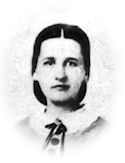July 28th, 1861.—Colonel Robert Howard Gamble is organizing “Gamble’s Artillery,” and Charley Hopkins has enlisted in that company and so have many others from Tallahassee. Aunt Sue brought a beautiful piece of French opera flannel and asked me to make Charley two shirts. I am a little doubtful as to my ability but if I find it too difficult I can get my Lulu to finish them for me; she sews so neatly and she makes all my clothes, under Mother’s direction. These shirts are blue and they are to have real silver buttons, which Aunt Sue has had made at the jewelers. She says silver will not tarnish as common metal buttons might do. Mr. Pratorius is making Charley’s uniform. I suppose I will learn all the different uniforms after awhile. The Infantry is gray, trimmed with blue, the buttons are of brass and the officers have gold lace on their sleeves, a chevron they call the design on the sleeves; a captain has three gold bars on his collar; the privates do not have any gold lace. Charley is in an artillery company and they wear a little red, but the uniform is gray, too. Cousin Willim Bradford is in a cavalry regiment and his gray uniform is trimmed with corn-color. They all look fine to me and I grow more patriotic all the time but Sister Mag says that is because I am not married. Ridiculous; I am just a child.
The Governor’s Guards volunteered some time ago and now they are re-organizing and will serve as an infantry company, with Captain G. W. Parkhill as their captain. The name has been changed to “The Howell Guards,” in honor of Mrs. Jefferson Davis, who was a Miss Howell. Soon they, too, will be going to Virginia; poor Sister Mag; she will be heartbroken I fear. The Captain is a fine looking man in his uniform but not so handsome as Brother Amos, who is 2nd Lieutenant in the Howell Guards. They are in camp now and are drilling every day.



